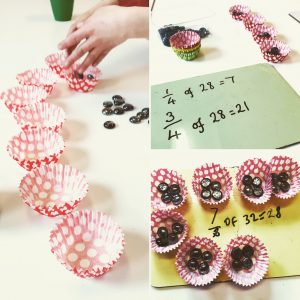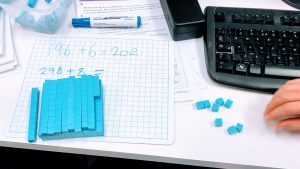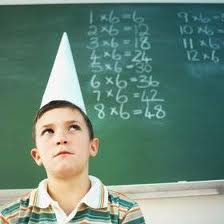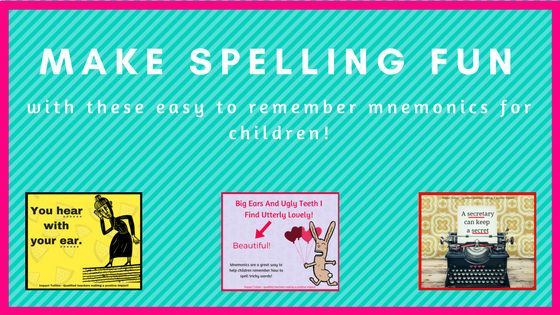How to help if your child has maths anxiety
Maths anxiety – is your child affected?
Many children do not make progress because of maths anxiety.
Maths anxiety is a common issue and I have worked with may pupils affected by it. Does the rather tricky looking equation pictured above fill you with fear? If so, you are not alone as studies suggest that up to 60% of the population have a negative attitude to maths and many people openly admit to being “useless” at maths.
Research from Stanford University in the USA reveals that the brains of those who suffer with maths anxiety are affected in a similar way to the brains of people with phobias. With around 2 million children understood to suffer to some extent with maths anxiety, what can be done to help?
Maths at school
The UK curriculum in maths is very full, with teachers under pressure to teach a great deal of content each school year. Often, there is not enough time for some children to consolidate new skills before the class moves onto a new topic. This can lead to children having a poor grasp of key concepts and a real lack of confidence. When the topic is visited again, it is at a harder level and children are even more convinced that they cannot “do” maths. I see this really often with fractions in particular.
Peter Lacey of the Association of Teachers of Mathematics says:
“If you say slow down, ministers get concerned, but if you want to build a tall and secure house, you make sure your foundations are right. Sometimes there’s a rush in the earlier years of teaching that interferes with children gaining real confidence – once it goes wrong at that stage, everything afterwards is insecure. The pressure to get children to a particular level in tests at 11 can mean teaching them tricks to get good outcomes rather than making sure they are confident in their understanding.”
How can you tell if a child has maths anxiety?
- Children with this condition will clearly have a negative attitude to maths.
- They will have very low self confidence when dealing with maths problems.
- Maths homework may be a huge problem.
- They may try to avoid maths and worry excessively about tests.
- They may have a defeatist attitude towards maths.
- New concepts cause major anxiety.
Maths anxiety in the classroom
As a teacher I have seen this condition on numerous occasions and really empathise with children who have it as I loathed and despised maths at school. One of my most vivid memories of primary school is feeling physically sick in a lesson because I didn’t understand long division. The teacher had done one example on the board and the class then sat in silence and worked alone from a page in Longman’s Maths. I sat and watched all the other pupils with their heads down, silently getting on with their work and felt sick, miserable and close to tears. I didn’t dare put my hand up to ask for help in case I looked stupid and besides, the teacher was working at her desk, not really paying attention to the class. Eventually though, she began to make her way around the room, marking work as she went; when she saw my blank page she went mad! So not only was I completely confused, I was now the centre of attention for my perceived stupidity.
How does maths anxiety differ from dyscalculia.
Hopefully the days of primary aged children working from books alone and in silence are long behind us but anxiety surrounding maths remains a huge problem. How many parents have heard the phrase “lacks confidence” or “doesn’t enjoy maths as much as English” at Parents’ Evenings? I know I have and I know I have used those phrases as a teacher! Maths anxiety differs from specific learning difficulties, such as dyscalculia, as it is an acquired response, whereas dyscalculia emerges at a very early age. Furthermore, maths anxiety can be specific to particular topics within maths such as fractions or algebra whereas dyscalculia tends to affect children in most aspects of arithmetic. Dyscalculic pupils tend to have a very poor grasp of place value, sequencing, estimating and general number sense.
How can we help children with maths anxiety?
As a parent you will most likely be aware if your child has a negative attitude to maths. You may have been told at school that your child lacks confidence or is struggling in lessons. You may have seen this anxiety manifest itself as a huge tantrum or tears when maths homework is set. Once anxiety sets in it becomes it can be difficult to alleviate as it makes it considerably more difficult to be open to learning. If the brain is sending panic messages it is not in optimum mode for understanding fractions! We have all had that rabbit in car headlights moment when you freeze and cannot think of the answer; for some children that is how they feel in maths. If your child does this during homework, stop and do something else – don’t keep asking questions as your child will just feel worse. Doing a different activity, even just getting a drink, will allow your child time to calm down and they may be able to successfully complete their work after a break.
Coping with anxiety.
Experts agree that children with maths anxiety need to have the anxiety problem treated before they can really get to grips with their maths difficulties.
- Breathing and relaxation techniques can help and research has shown that brains can solve maths problems more easily when people are relaxed.
- Encouraging a more positive attitude to maths is helpful, if you have a negative attitude to maths your child may pick up on it.
- Help children to fill in gaps they may have with basic skills; it is very difficult to make progress if children don’t have a firm grasp of previous learning.
- Try different learning styles, use real food to demonstrate fractions or play maths games to keep learning fun and lighthearted. Make learning multi-sensory so that children can see what is happening.
- Help your child understand that making mistakes is an important part of learning – research shows that brains are more active when you get something wrong than when you get it right!

How can you help your child with maths anxiety?
It is really helpful to establish which aspects of maths are causing the biggest problems – this often requires going back a few years to find were gaps in learning started to form. The gaps then need to be filled in with lots of precision teaching, repetition and consolidation. Do share your concerns with your child’s teacher. Some children are quite good at masking their feelings at school so whilst their teacher may be aware that maths isn’t their strength, they may not have picked up your child’s anxiety.
Multi-sensory learning
Lots of multi-sensory teaching is effective as many children can find numbers very abstract and need to be able to see and manipulate amounts to build their confidence. Counters, play dough, even dried pasta are all every day items you may have at home that can be used to help with maths understanding. Numicon is a great resource, with lots of YouTube videos to explain how it can be used available. Children need to learn that maths can be fun – using chocolate bars to develop an understanding of fractions usually works well! Maths anxiety will not clear up overnight, it takes time to set in and by the time it is noticed it is often deeply ingrained in a child’s self-esteem. Children need lots of repetition and learning in different ways before moving on to the next step. They also need lots of positive reinforcement and praise so that they begin to realise that they can do maths. Maths anxiety can be overcome but it needs to be addressed and understood for children to be able to get past it and make progress.

Helpful links
http://www.fulbridgeacademy.co.uk/our-curriculum/curriculum/domain-information/maths/100-things-to-do-with-numicon
https://www.wikihow.com/Help-a-Child-with-Math-Anxiety





